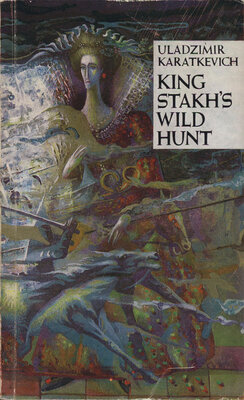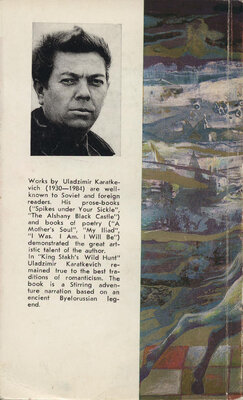King Stakh's Wild Hunt
Уладзімір Караткевіч
Выдавец: Мастацкая літаратура
Памер: 248с.
Мінск 1989
However, quite enough, for otherwise I risk never finishing my description. I was so carried away by the books that I did not immediately notice there was another person in the room. But he, in the meantime, got up from his armchair and was expectantly looking at me. On his
* Manuscripts telling of the creation of the world.
lips a pleasant smile, in his eyes a kind smile. With one hand on his belly he was timidly holding together the sides of his house-coat. We introduced ourselves:
“Andrei Belaretzky.”
“Ignas Bcrman-Gatzevich, the estate-manager,” his voice quiet and affable.
We seated ourselves. I looked at this man with great interest. What was it that held him in this awful place, this Marsh Firs? Money? But there wasn’t any. And he, as if anxious to answer my thoughts, said:
“Look what books there are here. Because of them I am living here. I am a book-lover.”
The book-lover was a small man and was badly built. His face, soft, gentle, too gentle for a man of 35, looked so lifeless, so much like a porcelain doll that it was startling. And in all respects he was too “doll-like”. Large grey eyes, long eyelashes, a straight little nose, pleasantly-formed lips. Like a little shepherd on a snuff-box... And his beard hardly grew, as was the case with many Byelorussians living in unhealthy marshland.
“You are from the northern parts of Greater Minsk, aren’t you?” I asked.
“Oh, the gentleman is not mistaken, yes,” he answered. “Previously I lived in a provincial city, but now here.”
Were I asked which trait stood out most of all in this little man, I should say “old-fashioned gallantry”. He was extremely well-bred, this little doll-like man, bred in the spirit of that provincial gallantry of the gentry, a gallantry that makes us laugh. When you look at such people, it seems that the children of their families, playing at hide-and-seek, hid themselves under the woollen, six-pieced skirts of
their grannies, grannies who knitted stockings or darned new socks so that they should not wear through so quickly.
This impression, however, soon vanished. Something of cruelly and puritanical stand-offishness was in his eyes, in his pursed lips. But the man that he was, that could not be taken away from him. He was a real connoisseur of books. That I understood in about twenty minutes. And moreover, I became convinced that this self-taught man knew ancient literature no worse than I, a man with a university education.
Therefore I directed our conversation towards the subject of the “Wild Hunt”.
“Why does this subject interest you?”
“I am an ethnographer.”
“Oh, then, of course. However, I doubt whether my modest person can tell you about that in a way required by so lofty a guest. Perhaps better to allow the yellowed pages of the books to do that. The gentleman understands the literary language of the 17th century, doesn’t he?”
With an artistic movement of his fingers (they were thin, twice as long as normal ones) he opened one of the bookcases.
And here now on my knees is an enormous volume written in a calligraphic hand in small letters turned brown with age: “The year one thousand six hundred and one knew no peace on this land. Judge Balvanovich has only just now investigated the murder — the ferocious murder— of His Worship Yanuk Babayed, committed by his serfs. And in other places, too, there was no peace. The cudgel came to the city of Vitebsk, to Krichyev and Mstislav, and here the serfs brought death and murder and savagery. Fourteen landowners were killed, and it was
said that three more were beaten so hard that it was uncertain whether they would live.”
But it is probably too long-winded to copy this in full. Therefore I shall relate the contents of this legend in a simple way:
In those days it was not only the serfs who rebelled. The ancient Byelorussian gentry, deeply offended by the new order, also rebelled. In the vicinity of Marsh Firs the situation was particularly restless. Here, in the Khadanowsky virgin forest, sat the lame Father Yarash Shtamet who supported the high-born Byelorussian landowher Stakh Gorsky, a relative through his ancestors of the Vilna Prince Alexander. This proud young man had but one aim: to achieve independence. He had everything on his side: the royal blood which flowed in his veins, which was very important then, the support of the Greek Orthodox Church believers and the “Forest Brethren”, the talent of a warrior, and what was most important — the awful poverty, the hopeless situation of the peasantry. The young leader was already called King throughout the entire region.
He gathered his forces in the meantime, and with great diplomacy clouded the heads of the representatives of the State Power. According to the manuscript his forces already consisted of 8,000 horsemen who were hiding partly in the virgin forest, and partly in his castle.
In the late autumn of 1602 all was finally ready. In the surrounding churches the peasants took the oath of allegiance to King Stakh, and with an unexpected stroke he seized the strongest castle in the district. They were only awaiting Yarash Shtamet with his followers, and since the army was strong, and the King
decisive and resolute, a bright new page might have been written in the history of Byelorussia.
Roman Yanowsky, a powerful magnate, the owner of Marsh Firs, was the only one who was not enthusiastic about King Stakh. The King suspected that Roman had entered into reprehensible relations with the Lithuanian hetman and even with the Roman Church. He warned Yanowsky that that would end badly for him. Yanowsky assured him of his respect and devotion and King Stakh believed him. He mixed his blood and Roman’s in a goblet, and then both parties drank it. Stakh presented Roman with a silver dish.
It is unknown what had compelled Roman to decide on the following move. We know, however, that he was a friend of the lawful King. He invited King Stakh to go hunting with him, and the King came to him with his hunters, a group of 20 men. Shtamet was to appear at the castle the following day and there was plenty of time. The King decided to make a short delay as the object of their hunt was a very tempting animal: the marsh lynx which reminded one in size and colour of a tiger, and which at that time was already rare in our virgin forests, and afterwards entirely disappeared.
What Roman had planned was black treachery. Wouldn’t God have blessed King Stakh’s reign if he had seized the throne of his ancestors, even though he was a muzhik king, even though he had rebelled against the lording sovereigns?
King Stakh arrived at Marsh Firs, and in his honour the castle was decorated with lights and feasting began. And he drank and made merry with the landowner, Roman, and the other landowners, and of these gentlemen there were, perhaps, a hundred and thirty. And at
night they rode off on the hunt, since the nights were bright, and on such nights the marsh lynx leaves its bushy haunts and walks about the plain from Marsh Firs to the Kurgany and Pnyukhi groves and catches not only cattle but also solitary wayfarers.
And that is why everybody hates the marsh lynx and kills it. The wolf will pass by, and the forest lynx will more often turn away, while the marsh lynx does not — he is a man-eater.
And so all the guests left, and Roman left to hunt the marsh lynx together with the King’s hunt and his faithful old friend, Alyakhno Varona, his beater-in, and with Dubatowk of the petty Polish gentry. And the night turned out to be one in which the moon barely shone and hardly anything was visible, and although it was autumn, blue marsh lights were skipping about in the swamps.
And people extinguished the lights in their dwellings, and, perhaps, even God, moved by his indescribable wisdom, extinguished the lights in some human souls, too. And Roman and King Stakh lagged behind their beaters-in.
They had hardly taken a look around, when a marsh lynx sprang out from the bushes, knocked down Roman’s horse, and tore out a piece of the horse’s stomach together with his intestines, for such is this animal’s habit. And Roman fell, and he felt mortal terror, for the animal, that was wider and longer than himself, looked at him with fiery eyes.
At this moment Stakh jumped down from his daredevil horse straight onto the animal’s back, grabbed it by the ear, tore its snout from Roman, who was lying on the ground, and with his short sword slashed at its throat. The lynx shook Stakh off with its paw and pounced hard
on him, but at this moment Roman jumped down and broke the skull of the man-eater with his fighting calk. And so the three of them lay there, and Roman helped the King to stand up, and said:
“We are quits, my friend. You saved my life, and I your heart.”
And then the hunters met them and decided to spend the night in the forest and drink again and make merry, for their souls and their hearts had not yet had enough food and drink after the struggle with the lynx, and they asked for wine. They made a camp-fire in the forest and began to drink. It was so dark when the moon disappeared, that on making a step from the fire you could not see the fingers on your hand. They took the barrel of wine that Roman had brought and they drank and made merry. Nobody knew that the wine was poisoned, except Roman, Varona and Dubatowk, who had beforehand accustomed themselves to this poison.
Everybody drank, only King Stakh drank little.
Just a moment, Roman. What are you doing, Roman? This man wanted to give up his life for his country. Do you then wish to exchange God’s plans for your own? You regret your supremacy, but have you thought that the will of your people is being trampled on, that their language and faith and their souls are being trampled on? You are not thinking of this, your heart is filled with envy and pride.
And they continued drinking until King Stakh’s hunters could hardly keep their eyes open. But the King kept on talking, saying how happy he would make everybody when he took his seat on the throne of his forefathers.
 КНІГІ ОНЛАЙН
КНІГІ ОНЛАЙН


